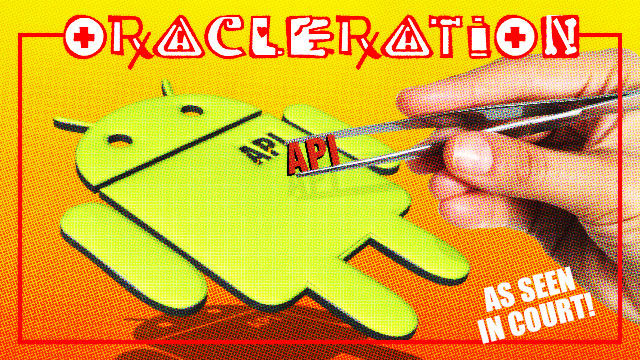
SAN FRANCISCO—"I always have to think when I write this out, because I'm not used to writing billions," Oracle lawyer Peter Bicks told a jury here as he wrote out "3,000,000,000" on a large sheet of paper.
"Three billion mobile phones have been activated with Oracle's property on them," he said. There are 100,000 Android phones being activated each hour, he continued. "$42 billion in revenue through all of those activations. Each with our client's property in them. Valuable computer code."
Bicks' verbal assault was the first volley in the second Oracle v. Google trial, a month-long legal showdown that could end with one of the largest civil verdicts in history.
Oracle is making its case to a jury that Google should be forced to pay massive copyright damages, due to the search company's use of 37 Java APIs in its Android operating system. It's the second courtroom face-off for the two software giants. Google argued that APIs shouldn't be copyrighted at all, but lost on appeal. Now Google's only hope is that the jury finds that its use of the APIs was a "fair use."
In Bicks' telling, Google's own e-mails told the story that the company deliberately chose to make an illegal "shortcut" by using Java in Android. "Google, one of the largest and most sophisticated companies in the world, made a deliberate business decision not to take a license and to copy and use oracle’s valuable software illegally," Bicks said. "Why? Huge profits."
Bicks' presentation overlapped in some ways with the company's 2012 case, but it was a less technical, more focused, and more morality-laden presentation. He painted the picture of a company that stood alone in its decision to break the rules.
He emphasized the importance of the API code, showing a "software map" that portrayed the connections between the accused APIs with bright lines. It was like a "complex blueprint to a magnificent building," he said. "You see the red on the screen? They took the heart of these packages."You may hear today that 11,000 lines is not a lot," said Bicks. "'We left a lot behind,' is what you'll hear. 'We took your property, but we didn't take all of it.' 11,000 lines is a lot of computer code."
The screens flanking both sides of the courtroom showed an Oracle slide of the Apollo moon lander. "It took 10,000 lines to power this Apollo computer module, when lives were at stake," Bicks said.
In case the jury missed the point, it popped up on the screen in all-caps: "OVER ONE THOUSAND FEWER THAN WHAT GOOGLE COPIED."
"We copied over 11,000 lines, and now it's fair use," Bicks said, channeling Google for the jury. "I call this case the fair use excuse."
Consequences
Bicks went on to show some of the "greatest hits" of Google's internal e-mails from 2012, including an e-mail from engineer Tim Lindholm to Google's Android chief, Andy Rubin, saying that alternatives to using Java "all suck."
"Don't get locked out!" Bicks read to the jury, quoting a Google document emphasizing the need to get into the mobile market quickly. "Their words, not mine," he said, a mantra he repeated several times during his opening statement.
"I told you earlier that Google broke a basic rule: you don't take people's property without permission," Bicks continued. "When you get caught, you make excuses."The use of Java had consequences. He told a brief history of the smartphone industry—Google was getting rich, while Oracle struggled. He quoted Oracle SEC statements saying that Android has "severely damaged" Java phone sales. "Android undermined Oracle's Java business," Bicks said. "Oracle was seeing money go out the door," and it was going to Google.
As an example, he noted that Amazon had moved away from doing a deal with Oracle for its Kindle Fire product, deciding instead to go with Android—a product he views as being built with Oracle's property. Oracle was stuck "competing against themselves," Bicks said. "Even worse than that, Google was giving away Oracle's property and making $42 billion in revenue."
Bicks didn't ask the jury for a specific amount in damages, but court documents made public earlier suggest that Oracle may ask for up to $9 billion. If he's successful in holding Google liable for copyright infringement, there will be a separate damages phase of the trial.
reader comments
198